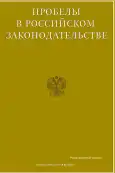Ways to Improve the Principles of Russian Criminal Law
- Authors: Balasanov M.R.1
-
Affiliations:
- Reutov City Court of the Moscow Region
- Issue: Vol 15, No 4 (2022)
- Pages: 379-388
- Section: Articles
- URL: https://journal-vniispk.ru/2072-3164/article/view/147581
- ID: 147581
Cite item
Abstract
The purpose of the research. The article considers the problem of the content of the system of principles of domestic criminal legislation. The legal positions of the European Court of Human Rights, the Constitutional Court of the Russian Federation, the Decisions of the Plenum of the Supreme Court of the Russian Federation, international and foreign criminal legislation are analyzed, and the writings of scholars are studiedlegal scholars in the field of principles of law. In October 2021, the author conducted a sociological study on the optimization of the principles of Russian criminal legislation, in the framework of which the staff of the judicial system and law enforcement agencies, as well as lawyers of the Moscow region, of which a total of 45 persons. The aim of the study is to identify ways to improve the principles of Russian criminal legislation. Results. As a result of the research, the author concludes that it is expedient to supplement the system of principles of Russian criminal legislation with the principle of legal certainty and the principle of inevitability of criminal responsibility. The singling out of these principles is conditioned by their theoretical and practical significance, which is expressed both in law enforcement activities and in the law-making process. Their implementation in criminal legislation will have an impact on the quality of criminal-law regulations, respect for the general legal guarantees of individuals and citizens, and will also contribute to the achievement of the objectives of domestic criminal legislation.
Full Text
##article.viewOnOriginalSite##About the authors
Mikael Rafaelevich Balasanov
Reutov City Court of the Moscow Region
Email: balasanovmikael@mail.ru
Master's degree in juridical sciences, secretary of the court session Reutov, Moscow Region, Russian Federation
References
- Bondar' N.S. Legal certainty - universal principle of constitutional normative control (practice of the Constitutional Court of the Russian Federation). Constitutional and municipal law. 2011. № 10. Pp. 4-10.
- Vasilenko M.M. On the question of the legislative delineation of the categories of «criminal responsibility» and «punishment». Eurasian Law Journal. 2018. № 10. Pp. 238-239.
- Vasil'ev A.M. Legal categories: methodological aspects of the development of the system of categories of the theory of law: monograph. Moscow: Norma: Infra-M. 2021. P. 264. ISBN 978-5-00156-068-5. Available at: https://znanium.com/catalog/product/1145272 (Accessed April 4, 2022).
- Dikarev I.S. The principle of legal certainty and the enforceability of a judgement in criminal proceedings: monograph. Feder. state. avt. will form. institution of higher education. prof. of «Volgogr. gos. unt». Volgograd: Izd-v VolSU. 2015. P. 175.
- Ershov V.V. Dual categories of «certainty of law» and «uncertainty of law». Certainty and Uncertainty of Law as Dual Categories: Problems of Theory and Practice: Proceedings of the XII International Scientific and Practical Conference. In 3 parts. M., RSUJ. 2018. Pp. 12-42. ISBN 978-5-93916-662-1.
- Zolotukhina N.M. Political and Legal Thought of XVI c.: Maxim Grek on Truth, Justice. Russian State University of Justice. Moscow: Publishing «Yurlitinform». 2018. P. 680. ISBN 978-5-4396-1586-5.
- Mal'tsev V.V. Principles of criminal law and public dangerous behavior. State and law. 1997.№ 2. Pp. 98-102.
- Nersesyants V.S. Law and Law. From the History of Legal Teachings: Monograph / V.S. Nersesyants, V.V. Lapaeva. Moscow: Norma: Infra-M. 2021. P. 368. ISBN 978-5-00156-159-0. Available at: https://znanium.com/catalog/product/1239235 (Accessed April 6, 2022).
- Pokrovskii I.A. Main civil law issues. 8th edition. Moscow: Statute. 2020. P. 351. ISBN 978-5-8354-1635-6. Available at:https://znanium.com/catalog/product/1225732 (Accessed April 2, 2022).
- Polyakov S.B., Sidorenko A.I. Significance of the principle of legal certainty in the judgments of the European Court of Human Rights. Lawyer. 2014. № 7. Pp 5-10.
- Sabitov T.R. The principle of the inevitability of liability in Russian criminal legislation. Bulletin of TSPU. 2006. № 11. Pp. 63-65.
- Criminal Law of Russia. Parts General and Special: textbook; ed. Brilliantova A.V. 2nd edition. revised and finished. Moscow: Prospectus. 2015. P. 1184.
- Filimonov V.D. Principles of the Criminal Code of the Russian Federation: achievements and shortcomings of their legal expression. Five years of operation of the Criminal Code of the Russian Federation: results and prospects. M. 2003. Pp. 133-137.
- Yavich L.S. The Right of a Developed Socialist Society. Essence and Principles. Moscow: Leg. lit. 1978. P. 224.
- Kirby M.D. Judicial Activism: Authority, Principle and Policy in the Judicial Method. London: Sweet & Maxwell, 2004. P. 154.
- Mahoney P. Judicial Activism and Judicial Self-Restraint in the European Court of Human Rights: Two Sides of the Same Coin // Human Rights Law Journal. Vol. 11. No. 1-2. P. 57-89.
- Schlesinger A.M., Jr. The Supreme Court: 1947 // Fortune. 1947. January. P. 245.
- Tushnet M. The United States of America // Judicial Activism in Common Law Supreme Courts / Ed. by B. Dickson. Oxford; New York: Oxford University Press, 2007. P. 445.
Supplementary files








